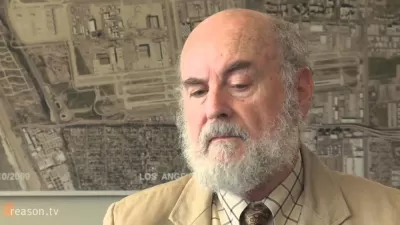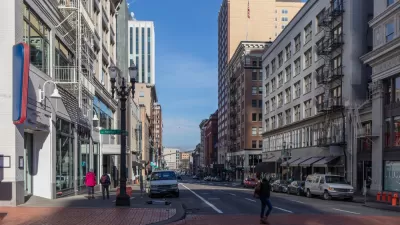USDOT employees, who are required to go back to the office, will receive free parking at the agency’s D.C. offices — flying in the face of a growing research body that calls for pricing parking at its real value.

In a nod to the late, great Donald Shoup, Kea Wilson argues that the U.S. Department of Transportation’s free parking initiative will “encourage driving by employees who otherwise would take transit — and inflict more congestion, emissions, and traffic violence on surrounding communities.”
Parking spots at the USDOT’s Washington office that once cost $155 per month will now be free and distributed through an annual lottery — including spaces once reserved for people with disabilities, carpoolers, and people who use their vehicles for work. “That policy, which may violate federal law, also runs runs counter to the District's own policies to encourage more sustainable commuting and curb the deleterious effects of cars in the nation's dense, transit-rich nation's capital,” Wilson asserts.
According to Daniel Herriges of the Parking Reform Network, “There are a handful of places in North America that basically would cease to function if everybody who works there drove in every day ... and I would say that the core of Washington, D.C. is absolutely one of those places.”
Although a 2022 law mandates that D.C. employers with over 20 employees provide parking cash-outs to employees who don’t drive to work, companies and organizations with their own parking lots, like USDOT, were exempt — “removing a powerful incentive for employers in transit-rich neighborhoods to stop offering parking to anyone and putting their lots to more productive use.”
FULL STORY: The High Cost of Free Parking: Duffy’s Parking Giveaway Will Cost the Rest of America

Montreal Mall to Become 6,000 Housing Units
Place Versailles will be transformed into a mixed-use complex over the next 25 years.

Planetizen Federal Action Tracker
A weekly monitor of how Trump’s orders and actions are impacting planners and planning in America.

DARTSpace Platform Streamlines Dallas TOD Application Process
The Dallas transit agency hopes a shorter permitting timeline will boost transit-oriented development around rail stations.

Study: 4% of Truckers Lack a Valid Commercial License
Over 56% of inspected trucks had other violations.

Chicago Judge Orders Thousands of Accessible Ped Signals
Only 3% of the city's crossing signals are currently accessible to blind pedestrians.

Philadelphia Swaps Car Lanes for Bikeways in Unanimous Vote
The project will transform one of the handful of streets responsible for 80% of the city’s major crashes.
Urban Design for Planners 1: Software Tools
This six-course series explores essential urban design concepts using open source software and equips planners with the tools they need to participate fully in the urban design process.
Planning for Universal Design
Learn the tools for implementing Universal Design in planning regulations.
City of Mt Shasta
City of Camden Redevelopment Agency
City of Astoria
Transportation Research & Education Center (TREC) at Portland State University
US High Speed Rail Association
City of Camden Redevelopment Agency
Municipality of Princeton (NJ)




























